Public servants are often unkindly portrayed as having a ‘clock-watching’ culture, but a bid by the federal Department of Human Services to issue some call centre managers with stopwatches to improve customer call times has come very publicly unstuck.
The Community and Public Sector Union claims it has “foiled” a plan by DHS managers in Western Australia to “stand over” their staff with the handheld timekeepers when taking calls following a backlash from workers on the call centre floor.
The public service union has accused DHS of using heavy-handed management tactics at the DHS call centre in Bunbury in WA, saying that around 200 staff there that would have been affected are already “working flat out, on old systems and dealing with complex matters.”
“The last thing they need is the added pressure of a supervisor clicking a stopwatch and taking notes. This takes micromanagement to a new level,” said CPSU Deputy President Lisa Newman.
Exactly why DHS managers had opted for stopwatches as a coaching tool is somewhat of a mystery, given that government call centre systems have had electronic timers to monitor the length of calls for years . . . and smartphones also have a stopwatch function.
DHS has also rejected the union’s claims that the proposed use of the stopwatches amounted to standover tactics.
“Quality listening and coaching with staff has been in place across the department for some time now, and is an approach applied in other smart centres in other states as well as standard industry practice,” a DHS spokesperson said.
“Our current practice involves checking call times by referring to the start and finish time on the staff member’s computer screen. It was proposed locally in Bunbury to use a stopwatch to capture information rather than using the staff member’s computer screen and was in no way intended to intimidate staff.”
Human Services also says that the stopwatch “proposal was set aside following feedback from a small number of staff and the use of stopwatches never actually commenced in the Bunbury Smart Centre.”
“The department is committed to providing a supportive workplace and the feedback to and from staff plays an important role in this,” the DHS spokesperson said.
The CPSU said that “putting more pressure” on call centre staff would not going to speed up the turnover of calls or improve services to clients.
Queues and caller waiting times have resurfaced as an acutely sensitive political issue this year, with Treasurer Joe Hockey using talkback radio to blame Centrelink’s legacy technology systems for delays experienced by its clients.
Mr Hockey has estimated that core systems overhauls at both DHS and the Australian Taxation Office will cost “billions” to undertake, although the government is yet to indicate a timeframe or where the money for the giant IT upgrades might come from.
In the meantime, it is understood that staff working in welfare agencies are bracing for an increase in customer hostility if many of the government’s Budget measures to prune back welfare payments make it through a turbulent and often uncooperative Senate.
A key issue for call centre and counter staff previously identified by Centrelink is that an increase in routine automated transactions and reporting using online and electronic technology has acted to concentrate the proportion of more challenging clients that frontline staff are required to deal with.
Comment below to have your say on this story.
If you have a news story or tip-off, get in touch at editorial@governmentnews.com.au.
Sign up to the Government News newsletter

